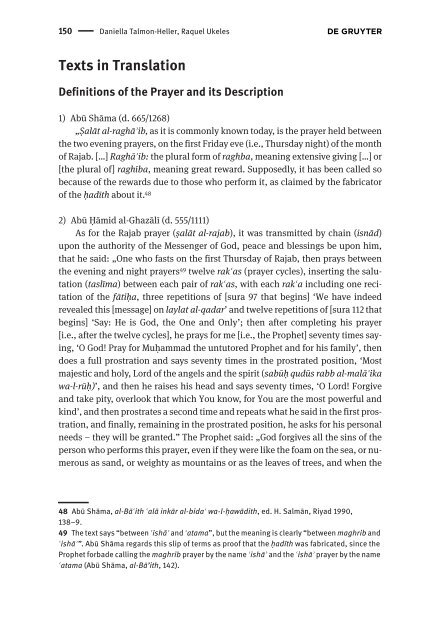0021-1818_islam_98-1-2-i-259
0021-1818_islam_98-1-2-i-259
0021-1818_islam_98-1-2-i-259
Create successful ePaper yourself
Turn your PDF publications into a flip-book with our unique Google optimized e-Paper software.
150 Daniella Talmon-Heller, Raquel Ukeles<br />
Texts in Translation<br />
Definitions of the Prayer and its Description<br />
1) Abu Shama (d. 665/1268)<br />
„Salat al-ragha#ib, as it is commonly known today, is the prayer held between<br />
the two evening prayers, on the first Friday eve (i.e., Thursday night) of the month<br />
of Rajab. […] Ragha#ib: the plural form of raghba, meaning extensive giving […] or<br />
[the plural of] raghiba, meaning great reward. Supposedly, it has been called so<br />
because of the rewards due to those who perform it, as claimed by the fabricator<br />
of the hadith about it. 48<br />
2) Abu 0amid al-Ghazal\ (d. 555/1111)<br />
As for the Rajab prayer (salat al-rajab), it was transmitted by chain (isnad)<br />
upon the authority of the Messenger of God, peace and blessings be upon him,<br />
that he said: „One who fasts on the first Thursday of Rajab, then prays between<br />
the evening and night prayers 49 twelve rak^as (prayer cycles), inserting the salutation<br />
(taslima) between each pair of rak^as, with each rak^a including one recitation<br />
of the fatiha, three repetitions of [sura 97 that begins] ‘We have indeed<br />
revealed this [message] on laylat al-qadar’ and twelve repetitions of [sura 112 that<br />
begins] ‘Say: He is God, the One and Only’; then after completing his prayer<br />
[i.e., after the twelve cycles], he prays for me [i.e., the Prophet] seventy times saying,<br />
‘O God! Pray for Mu1ammad the untutored Prophet and for his family’, then<br />
does a full prostration and says seventy times in the prostrated position, ‘Most<br />
majestic and holy, Lord of the angels and the spirit (sabuh qudus rabb al-mala#ika<br />
wa-l-ruh)’, and then he raises his head and says seventy times, ‘O Lord! Forgive<br />
and take pity, overlook that which You know, for You are the most powerful and<br />
kind’, and then prostrates a second time and repeats what he said in the first prostration,<br />
and finally, remaining in the prostrated position, he asks for his personal<br />
needs – they will be granted.” The Prophet said: „God forgives all the sins of the<br />
person who performs this prayer, even if they were like the foam on the sea, or numerous<br />
as sand, or weighty as mountains or as the leaves of trees, and when the<br />
48 Abu Shama, al-Ba^ith ^ala inkar al-bida^ wa-l-hawadith, ed. H. Salman, Riyad 1990,<br />
138–9.<br />
49 The text says “between ^isha# and ^atama”, but the meaning is clearly “between maghrib and<br />
^isha#”. Abu Shama regards this slip of terms as proof that the hadith was fabricated, since the<br />
Prophet forbade calling the maghrib prayer by the name ^isha# and the ^isha# prayer by the name<br />
^atama (Abu Shama, al-Ba’ith, 142).


